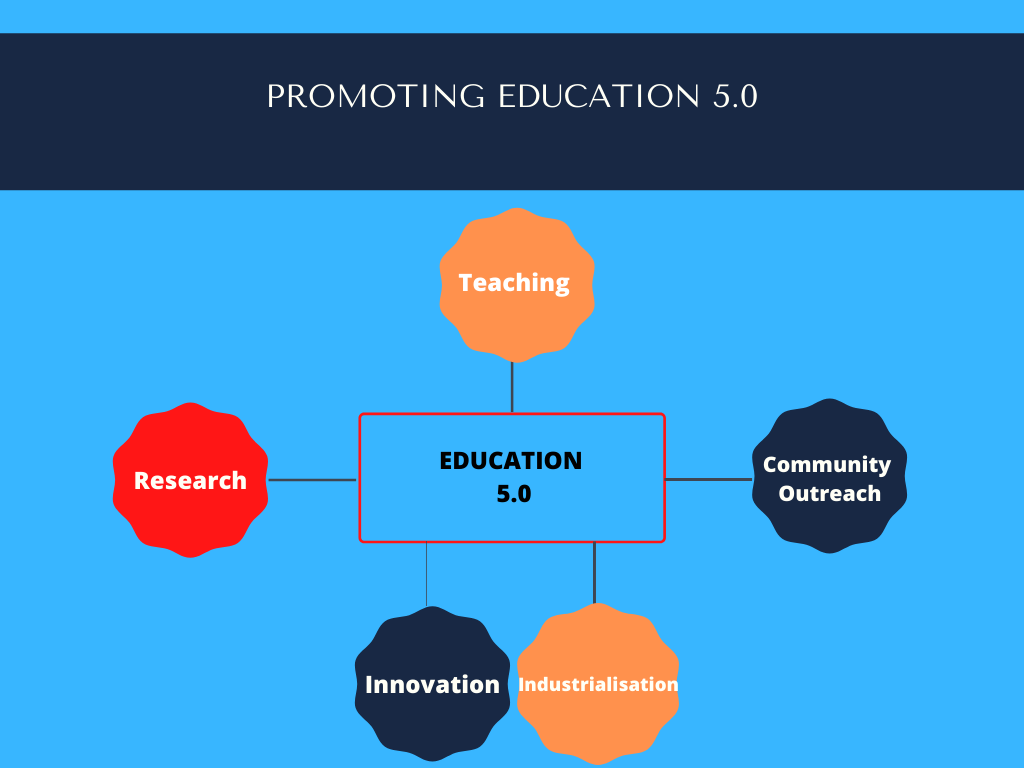
EDUCATION 5.0 is a policy that has been adopted by the government with a specific focus on inculcating in both educators and students the idea of generation and implementation.
It is a policy that is, indeed, sound on paper and weak at the point of implementation because of a gamut of factors that this opinion piece seeks to explore and exploit.
This paper intends to evaluate the Education 5.0 policy against individual factors like expertise, motivation, personality traits, cognitive factors, social skills and attitudes of idea generators and idea implementers within the purview of project management.
Education 5.0 in terms of idea generation is underpinned by five pillars, which are community service, lecturing, research, innovation and industrialisation.
These pillars of Education 5.0 should be viewed as complementary to one another, as opposed to being in competition.
This augmentation in terms of project management embraces cross-functional collaboration between and among team leaders, team members, consumers of idea generation and implementation and many other stakeholders involved in a project.
Education 5.0 in the legalese of project management is an idea that potentially can have an impactful outcome that can be defined in terms of its capability to offer services and products to the Zimbabwean community and beyond.
However, for any idea generation to be effective concerning idea implementation, there are individual factors, as cited in the vignette, that need to be considered.
- Mavhunga puts DeMbare into Chibuku quarterfinals
- Bulls to charge into Zimbabwe gold stocks
- Ndiraya concerned as goals dry up
- Letters: How solar power is transforming African farms
Keep Reading
These factors constitute the centre of gravity for innovation and will form the basis of the discussion.
Expertise is critical in idea implementation. Without job knowledge, innovation (idea implementation) suffers a stillbirth.
An examination of the Zimbabwean education system reveals that curriculum innovation is done without any engagement of street-level bureaucrats like educators who are at the point of service delivery.
For example, the Heritage Based Education Curriculum came as a cup of coffee for educators and educator organisations, that is, it was instantaneous.
Educators and educator organisations were not involved in its development and every other paraphernalia associated with curriculum change, like books and syllabi, were not ready at the time of the introduction of the Heritage Based Curriculum.
Essentially, this was a professional earthquake for educators in Zimbabwe as they were found napping, without the relevant official properties and epistemic values to cope with the innovation.
Motivation in the whole process of change is the lubricant of idea implementation.
Educators in Zimbabwe at every level are not happy about their salaries.
They lack both internal and external movere (motivation to drive idea implementation of Education 5.0.
For any innovation to be successful, there is a need for a supportive work environment that can spur workers to work with a sense of obligation and duty. At the material time, educators in Zimbabwe are more worried about moonlighting than they are about the four walls of the classroom or lecture room.
Personality traits of teachers are also important in driving idea implementation.
These personality traits may not be homogeneous but are triggered by both internal and external environments.
Generally, educators in Zimbabwe no longer have the zeal to work beyond the call of duty because the idea generators of Education 5.0 brought into existence a policy that is not supported in terms of organisational practices, culture and resources.
Their personality traits can safely be characterised under a “whom it may concern attitude. Idea implementation cannot be effective, efficient, sustainable, coherent and impactful when educators’ personality traits no longer put a premium value on their work.
Attitudes can either make or break idea implementation. The attitudes of most educators in Zimbabwe are at odds with Education 5.0 because the idea generators of the policy under discussion have not considered the fact that a goose can only lay golden eggs if it has been given food.
For example, for research, community service, lecturing, innovation and industrialisation to take shape, educators need economic resources to be ring-fenced for research and development, look and learn visits, real-time machine learning, cloud computing and collaboration.
Educators cannot pour from empty cups; educators need to be equipped to realise the success goals of Education 5.0. Educators in Zimbabwe have since stopped investing in hope, the hope that things will be better one day, so they now have a “to whom it may concern attitude, which is corrosive to idea implementation.
Cognitive structures of educators in Zimbabwe are, at the material time, experiencing dissonance.
This dissonance comes with split attention: stay put or leave Zimbabwe. Cognitive dissonance is not protective or promotive of idea implementation because it causes educators to defocus from the trajectory of idea implementation. For any policy, intervention, project, or programme to succeed, there is a need for a singleness of focus and fixity of purpose between and among idea generators and idea implementers. For Education 5.0, it is a tale of Alice in Wonderland.
Idea implementation requires social skills from those people at the point of both idea generation and idea championing.
In the case of Education 5.0, the idea generators have lacked social skills in that they have not engaged in eyeball leadership, which would be significant in giving them feedback that is critical for knowledge and decision-making.
The ivory tower mentality of idea generators has promoted border protection and operational silos in the education sector to the extent that an Education minister thinks that he or she is the be-all and end-all of epistemic values. Idea generators of Education 5.0 should realise that business is not only transactional, but also relational, communal, sacred and ethical. Idea implementers have families to feed, children to send to school and rentals to pay.
My humble and innocent submission is that until idea generators realise that there are critical individual-level factors that influence idea implementation, Education 5.0 may remain a pie in the sky for Zimbabweans.
Nicholas Aribino is an inclusion and development specialist. He writes here in his own capacity.










